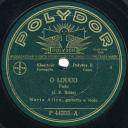 For this week’s entry, we’ll stay located on the Iberian Peninsula and examine an early, classic fado.
For this week’s entry, we’ll stay located on the Iberian Peninsula and examine an early, classic fado.
Much has been written about the Portuguese “song of fate” and there is little chance that I could add anything new to the subject. However, some brief notes for those interested: the origins of the fado are muddy – some say it originated from Portuguese sailors and their songs of longing for home (there are theories that the rhythm of the fado evolved from the lurching, rolling waves at sea). Others claim that the roots of the fado came from Brazil, and made their way to Portugal in the 19th century. Some claim it came from the Moors, although other musical styles from the same general area, such as flamenco, seem more obviously connected to North Africa.
Several qualities are evident: a true fado is performed accompanied by a guitarra and a viola da franca. The viola da franca or violão is another name for the Spanish guitar. The guitarra is the name for a lute with a rounded sideboard and six double strings of wire. Perhaps most importantly, the fado is always accompanied by the inexpressible feeling of saudade. As folklorist and ethnographer Rodney Gallop put it in 1933*:
The true fado is always sad. Usually in the minor, it retains even in the major the melancholy character associated with the minor. It may be wild, finely exultant in its sadness, seeming to revel in tragedy; or, more often, striking a note of pathetic and almost languid resignation. Its sophisticated cadences breathe a spirit of theatrical self-pity combined with genuine sincerity. It is emotional, passionate, erotic, sensuous, one might say meretricious, and yet, like some rustic courtesan, fundamentally simple and unpretentious.
This fado, uncollected on any CD, was recorded ca. 1929, in Lisbon by the German Polydor company. I could find little written about Maria Alice, a genuine fadista if there ever was one. (She is NOT to be confused with a Cape Verdean singer of the same name.) I’ve been able to find imported recordings of fados by Alice that were released in the late 1920s in the United States on the Brunswick label. Unsurprisingly, little of her work has seen the light of day since. One track can be found here, although I cannot vouch for the transfers.
Technical Notes
Label: Polydor
Issue Number: P 44233
Matrix Number: 2758 BK
*Gallop, Rodney. “The Fado (The Portugese Song of Fate).” The Musical Quarterly 19/2 (1933): 199-213.
I downloaded this while the gettin’ was still good, and I’ve got to admit that this turned out to become one of my most favorite records ever — top 10 for sure.
Thank you so much for this song & for all the other beautiful & fantastic music!
Thanks very much!
I need more Fado, old fado especially. Any tips on good and available collections? Much appreciated. I stop by every sunday night, Thank you!
There is quite a lot on CD, actually. Stay tuned, I plan a major addition to the site soon regarding reissues.
You can find three new releases from tradisom in the page http://www.tradisom.com. One of those records covers the first 20 recordings of Maria Alice. Fantastic sound. You can listen two.
Best regards.
Are the lyrics, either in Portuguese or English, posted anywhere?